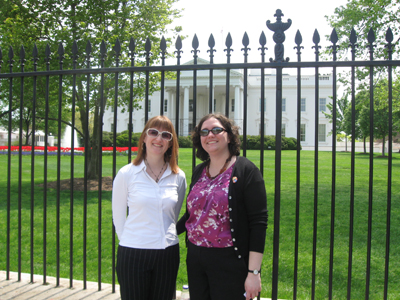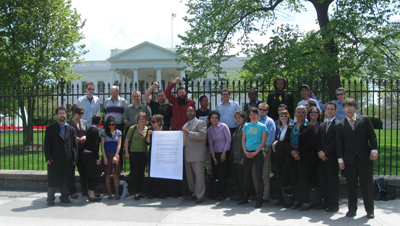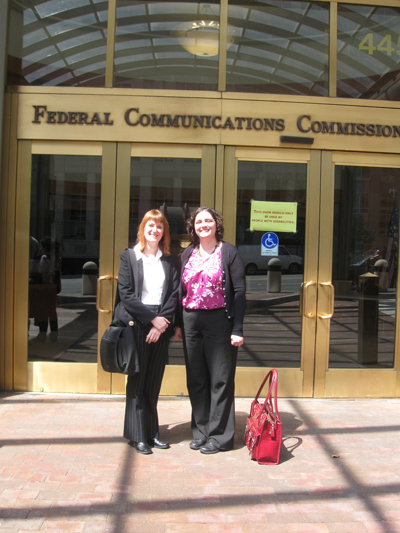| « What's in a Name? Daniel Says It All | Preview: King Khan & the Shrines @ Bottom Lounge, 5/15/09 » |
Feature Thu May 14 2009
Getting Down with Low Power FM
Hometown hero Steve Albini may have pegged "The End of Radio" with his band Shellac a few years ago, but thriving in Chicago is a group of music fans and faithful volunteers that are championing one station as the future of independent radio. CHIRP, the Chicago Independent Radio Project, is a dedicated organization working to secure a broadcast license for a new community radio station in Chicago.

CHIRP's Shawn Campbell and Jennifer Lizak at 1600 Pennsylvania Ave.
The station, according to CHIRP, would be "committed to local, independent programming, and generally furthering the causes of localism, diversity, and independence in broadcasting." CHIRP and its dedicated group of volunteers have recently been working on their new studio space, getting ready to launch the web version of the station this summer, and locally supporting music with the popular CHIRP Record Fair. As CHIRP continues to fight the good fight, convincing Congress and the FCC to remove existing barriers to grant low power FM radio licenses in urban areas, the group stays focused on providing a voice for the local and vibrant music community.
Gapers Block: Transmission recently spoke to CHIRP Vice President Jennifer Lizak about her and President Shawn Campbell's recent visit to Washington, DC representing CHIRP at the Low Power FM Leadership Days.
Gapers Block: Overall how was the trip to Washington for CHIRP?
Jennifer Lizak: The trip was very positive overall. We were thrilled and energized to meet with other community radio advocates from across the country, share ideas, and work together. Getting to lobby our legislators was a wonderful experience, and our meetings with the FCC representatives and White House team were also very positive. We came back to Chicago convinced that we'll see movement on the Local Community Radio Act in 2009.

GB: For people that aren't familiar with the issue of Low Power FM stations, how would having a LPFM broadcast license help benefit CHIRP and Chicago as a whole?
JL: Getting a Low Power FM radio license is CHIRP's driving goal. For non-profit, community focused organizations like us, the LPFM radio license is really the only way to get a radio station. Commercial broadcast signals are largely already claimed, and even if there were to be an opening, it would be cost-prohibitive for a group like CHIRP to get one. Congress created the LPFM radio service exactly for people like us, with the goal of serving local communities. Having an LPFM license would help CHIRP because while we will launch a web-based station this summer, we believe that in order to truly serve the Chicago community, we also need a terrestrial, over the air, radio broadcast. While online audiences are growing, they still shut out many people, including those who do not have access to personal computers or the internet, do not work in offices with computers, do most of their radio listening in the car, etc. We want to be able to serve the most amount of people, which is why getting a LPFM license is important to us.
GB: What exactly is the Local Community Radio Act? How does it directly affect local and national broadcasting?
JL: The Local Community Radio Act is a bipartisan effort to expand LPFM radio service, particularly in urban areas. The bill would expand non-commercial low power FM radio and allow locally produced, community radio to flourish. Congress limited LPFM radio in 2002 due to claims of interference by large corporate radio conglomerates. After a taxpayer funded $2.2 million study called the Mitre Report concluded that there would be no interference, it is time to Congress to set the record straight and expand LPFM service. If the Local Community Radio Act passes, hundreds of new LPFM licenses would be available to nonprofit community groups across the nation — hopefully, including CHIRP!

GB: What was the most memorable event for CHIRP during the trip to Washington?
JL: For me, the most memorable event was meeting with Susan Crawford, President Obama's technology advisor, and Jim Kohlenberg, White House Office of Science and Technology Policy Chief of Staff. CHIRP was asked to lead the meeting on behalf of all of the lobbyists, and Shawn and I were able to speak directly about the struggles were are facing in bringing a LPFM radio station to Chicago, President Obama's hometown. Last year, Shawn and I met with then-Senator Obama's staffer, and convinced him to ask the Senator to sign on as a co-sponsor — this year, we're sitting in the White House Conference Center speaking about our previous conversations, and asking for the President to help push the legislation!
GB: What have been some of the triumphs and obstacles CHIRP has encountered since it formed?
JL: I think CHIRP has faced the same obstacles any non-profit startup might face in terms of founding an organization, figuring out how to fill out the correct paperwork, finding a place to hold meetings, etc. Luckily we have been blessed with a President, Shawn Campbell, who never tires in her quest for CHIRP's expansion and success, as well as with a variety of volunteers from all walks of life with diverse skill sets. In terms of triumphs, I think our annual Record Fairs in the spring and at Pitchfork are some of our brightest moments... but of course with the online launch this summer, the best is yet to come!
GB: I know the CHIRP Record Fair will be around this summer again at Pitchfork. Any other events that are shaping up for CHIRP in the next few months?
JL: Indeed, CHIRP will be at Pitchfork again this summer with a Record Fair. We are also doing a monthly event every second Friday of the month at the Atlantic (5062 N. Lincoln Ave) - "Fly Day Friday," a showcase of CHIRP DJs. There's no cover, an assortment of drink specials and the Atlantic will make a much-needed donation to CHIRP's continued progress toward securing a broadcast license for a new Chicago community radio station committed to local, independent programming. Additionally, we anticipate having several parties and events celebrating our launch this summer, and you'll also find us out at street festivals this summer too!
GB: How can people help out CHIRP or get involved with the organization?
JL: We hold quarterly meetings for new volunteers, and you can sign up for more info with our Volunteer Coordinator, Jenna Murfin, at jenna@chirpradio.org.















